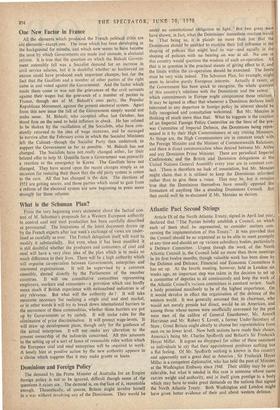Dominions and Foreign Policy
The demand by the Prime Minister of Australia for an Empire foreign policy is not to be ignored, difficult though some of the questions it raises are. The demand is, on theeface of it, reasonable enough. Theoretically, of course, Britain might involve herself .in a war without involving any of the Dominions. They would be
undeer no constitutional obligation to fight. But two great wars have shown, in fact, what the Dominions' immediate reaction would be. That being so, it is plainly no more than just that the Dominions should be enabled to exercise their full influence in the shaping of policies that might lead to war—and equally in the shaping of policies, with no bearing on war at all. No one in this country would question the wisdom of such co-operation. All that is in question is the practical means of giving effect to it, and the limits within the co-operation should be exercised. The limits must be very wide indeed. The Schuman Plan, for example, might seem to involve purely European interests. Actually it raises, as the Government has been quick to recognise, the whole question of this country's relations with the Dominions and the extent which commitments in Europe might compromise those relation.
It may be agreed in effect that whenever a Dominion declares itself interested in any departure in foreign policy its idterest should be fully recognised and consultation welcomed. But Mr_ Menzies is thinking of much more than that. What he suggests is the creation of an Imperial Foreign Policy Committee on the lines of the pre- war Committee of Imperial Defence, the Dominions being repre- sented in it by their High Commissioners or any visiting Ministers. As things are, the High Commissioners are in constant touch with the Foreign Minister and the Minister of Commonwealth Relations, and there is direct communication when desired between Mr. Attlee and any Dominion Prime Minister. There are periodical Imperial Conferences, and the British and Dominion delegations at the United Nations General Assembly every year are in constant con- tact. 'There is therefore no lack of association, but Mr. Menzies
might claim that it is utilised to keep the Dominions informed rather than to give them a voice. That may be, but it remains true that the Dominions themselves have usually opposed the formation of anything like a standing Dominions Council. But that could well be re-discussed if Mr. Menzies so desires.














































 Previous page
Previous page